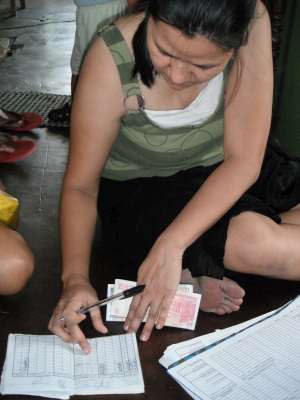In much of the developing world, the number of able-bodied workers far out-weighs the number of jobs that have been created to employ them.
First, many of the poor defeatedly resign to the fact that there are no jobs for them, and make do eeking out a living as best they can, with a day-to-day, hand-to-mouth mentality.
Urban poor Filipino culture does not typically lend itself to long-term risk-taking, accumulating capital that could be invested in a start-up business, nor pushing oneself to dream big and work for that dream. Many Filipinos (who are capable of working but don’t have work) live off the good graces of family members & relatives who do have a job, thereby spreading the meager wages thinly. The income is enough to suffice from day-to-day, but if (when) an emergency arises, they are often forced into cycles of debt.
Secondly, those who are employed are not often treated fairly, but they don’t complain, because they could easily be replaced, as 10 other people are likely waiting to apply for their job.
In the Philippines, most major food chains, stores, and government labor jobs function under a system of contract labor. Jollibee, (the Filipino competitor of McDonald’s) for example, will often hire workers part-time for only six months at a time, paying them “training period” wages closer to P250/day (minimum wage is P426/day), and clocking them as working 6-hour days, though they are given ‘stay-until-you-get-the-job-done’ assignments that usually keep them there 8+ hours. (Contract labor is not legally required to pay benefits.)
In bringing about justice, one of the best areas we can target is job creation.
Entrepreneurship has the potential to not just help the ones starting an enterprise, but the additional people they might employ in the future.
In the long-term, nurturing the supposed 10% of the population who have innate entrepreneurial skills could off-set the disproportionate job-to-worker ratio, making the unjust jobs less competitive. Theoretically, given enough rise of entrepreneurialism, unjust jobs may be forced by the market to reform.
But even on an individual level, from the start, entrepreneurialism can imbibe a certain self-confidence and a breath of new life.
Katie’s story of Ate Rebecca: Manila, Philippines.
In the urban poor community I live in, I have a good friend named Ate Rebecca. (Ate means ‘older sister.’) My host mom had been employing her for a while to wash our family’s clothes, but when that stopped working out, she began asking to borrow money from me, with a pitiful pout. I knew better than to get on a lending spree with her, but agreed instead to support her short-term while we explored alternative job possibilities for her. We visited a ministry that counsels in livelihood options, and she chose to try soap-making. We attended a free seminar and invested in a small kit for making dish-soap. We kept meeting together to check-in as Ate Rebecca led the way on selling soap to her friends and neighbors.

I soon noticed a marked change in her attitude. She now felt more in control of her financial situation, commenting, “I hadn’t thought of this as something I can do, but now… I’m doing it!” We discussed what portion of the earnings ought to go back into capital for the business, what part to set aside for saving & repaying long-overdue loans, and what part could be spent on a conservative but healthy lifestyle for her and her family.
It all seemed very promising until we discovered that the quality of soap was noticeably inferior, and none of her friends and neighbors were coming back for more. This was our first major hiccup. After much consideration, we upgraded to a bubbly version and tried again. But the momentum had been lost, and the nearby friends: disinterested.
We’re currently shelving the project, but the experience was not a waste. It gave Ate Rebecca a taste of taking charge of her lack of employment, and me a window into the hurdles & responses, and transformation of one trying out entrepreneurship.
God calls us to:
- Seek justice for the oppressed.
“Learn to do right; seek justice. Defend the oppressed. Take up the cause of the fatherless; plead the case of the widow.” -Isaiah 1:17
Job creation and nurturing entrepreneurship is a good way to work towards this justice.
- Wise investment of capital.
The ‘Parable of the Talents’ in Matthew 25:14-30 points us toward a responsibility for creative investment and money management.
Another, (more often overlooked), key feature of this story is the lending of capital. The church should consider how to engage the poor in business skills training, and careful lending of funds. Funds could come from either a revolving loan fund initiated by wealthier members of the church, or accumulated by the poor themselves in a ‘paluwagan’ style savings cooperative.
* Paluwagan is a Filipino system in which members agree to each put small amounts of cash into a kitty weekly, and then lend the kitty to a different member each period. It’s a useful way for the poor to collect capital without outside intervention.
In sum, enabling entrepreneurship can be a central component to the church’s response to seeking justice for the poor.
For the printable Word doc version of this post, click here:
TUL 640 – Proj 2 – Theology of Entrepreneurship short – 3-9-13
